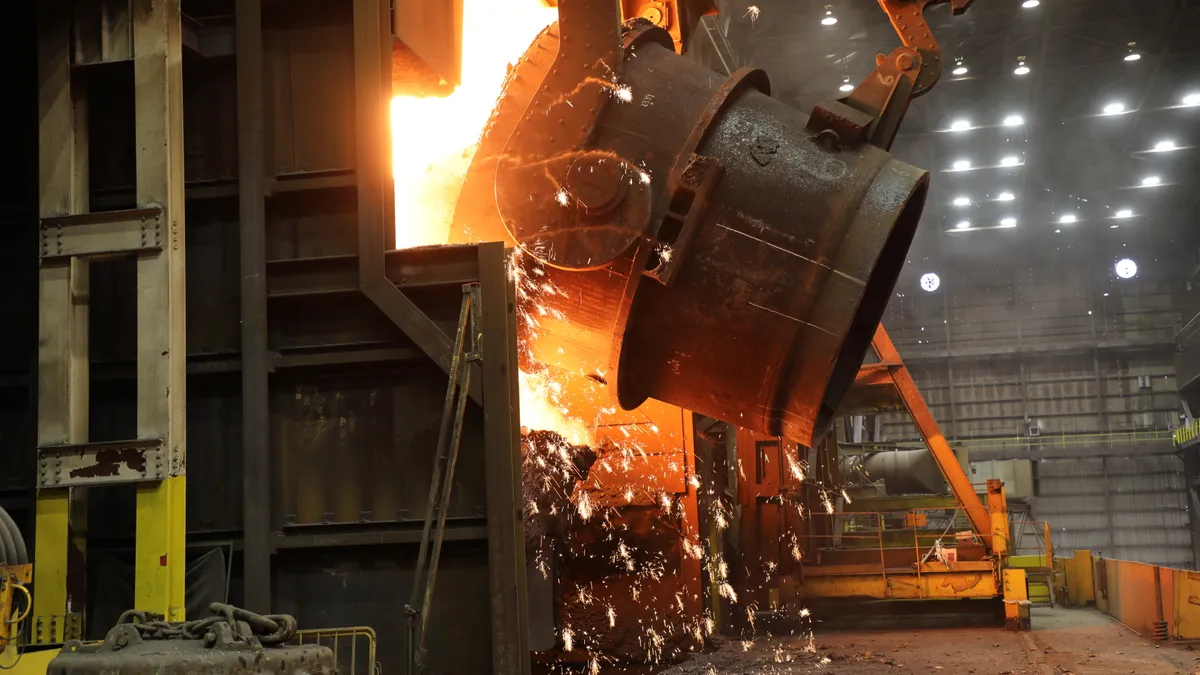Manufacturers are bracing for the impact of President Donald Trump's newly announced 25% tariffs on all steel and aluminum imports.
The tariffs, which do not include any exemptions or product exclusions, could drive up operational and supply costs for manufacturers that rely on steel inputs, according to Greg Husisian, chair of the international trade and national security practice at Foley & Lardner.
Much remains to be seen, however, when it comes to how the new trade order will interact with existing steel tariffs that Trump enacted during his first term, or how far the tariffs will extend into downstream steel products, Husisian said.
Many manufacturers rely on foreign steel suppliers – finished steel imports made up approximately 23% of the commodity's consumption last year, according to the American Iron & Steel Institute. Higher tariffs could push more manufacturers to turn to the domestic steel market, which could drive up prices and push steelmakers to increase domestic production capacity, Husisian said.
Metal recycler Greenwave Technology Solutions, which supplies steel mills with recycled materials including steel and aluminum, is already seeing prices for scrap metal rise, with prices up 10% so far this month, according to CFO Isaac Dietrich. Nucor, one of Greenwave’s largest customers, has increased its orders as it moves to a primarily domestic supply chain, Dietrich added.
While demand for U.S. steel is likely to rise as a result of the tariffs, Husisian said it’s unlikely that will translate to significant job growth.
“The one thing I know it won't have a big impact on is U.S. steel manufacturing jobs," Husisian added. "The idea that we're ever going to be anywhere near the 300,000 manufacturing steel jobs that we had at one point is just never going to happen."
There were roughly 83,600 workers employed in iron and steel mill and ferroalloy production in the U.S. in 2023, according to the Federal Reserve Bank of St. Louis. Employment in the industry has fallen steadily over the last few decades, down from nearly 200,000 workers in 1988.
Job growth could come in smaller batches, however — Dietrich said Greenwave is likely to add roughly 50 workers this year due to heightened demand.
The tariff move could help to bring more financial stability to the U.S. steel industry, which has seen some volatility over the past year amid Japan-based Nippon Steel's bid to acquire U.S. Steel. On Friday, Trump commented that the deal would now take the form of Nippon's investment in U.S. Steel, though the company has yet to publicly confirm that information.
Industry groups applauded the tariff news, with Steel Manufacturers' Association President Philip Bell calling it a way to help "[level] the playing field for American manufacturers."
"Tariffs are a powerful tool to fight against unfair trade and state-sponsored overcapacity around the world and compel other nations to take a serious approach to fair trade,” Bell said in a statement Monday.
Other manufacturers, however, aren't as optimistic about the impact. The Association of Equipment Manufacturers said in a statement it was “alarmed" by the tariffs that it says are likely to disrupt supply chains, drive up equipment production costs by up to 7% and threaten jobs.
Manufacturers expressed some concern about the threat of tariffs in recent earnings calls. Tractor maker AgCo SVP and CFO Damon Audia said in a call last week that while it expects minimal impact from tariffs on Canada, Mexico and China, heightened duties on inputs from the European Union, such as steel, would have more negative ramifications.
For manufacturers trying to mitigate the impact of the tariffs, Husisian said now is the time to create plans for alternative suppliers as well as plans for added supply chain, pricing and contractual flexibility. Force majeure will be tough for manufacturers to rely on in supplier contracts, as tariffs are often viewed as foreseeble risks, he added.
“A lot of people were taken by surprise in the first Trump administration,” he said. “Don't be taken by surprise this time. He is very serious about this, he has a playbook.”















